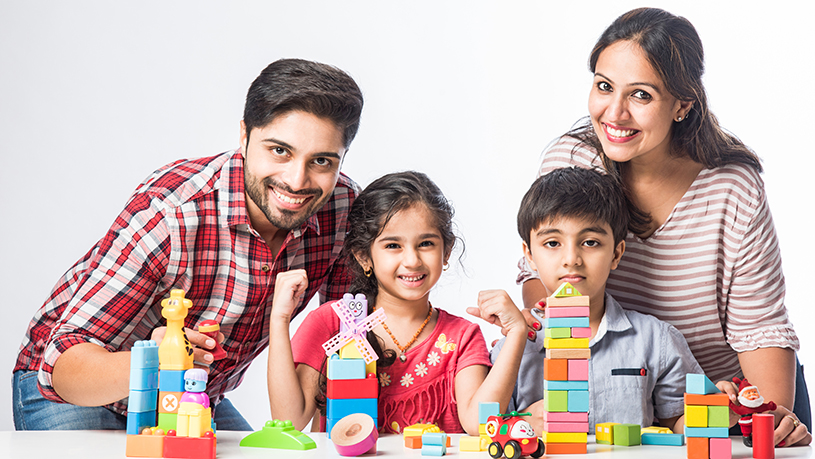Are you Ready to Play? By Dr. Namitha Raju

What comes to your mind when you think of play? Do you feel stressed out because you feel you don’t have the time to play with your kids? Or do you feel that play is frivolous and is not the best place to invest your time? Or that you have tried and you find it difficult to participate in play with your kids. If you feel any of these, I am here to tell you that you are not alone and my intention in this article is for us to explore the world of play to see why it’s important, why it’s difficult for some of us to play, and how to implement play with our kids. Let’s start with understanding the importance of play.
All of us have a strong need for connection, and this is especially true for our kids. What is this connection? It’s something that’s created when we feel heard and understood. Connection is a vital component in any relationship without which trust cannot develop. Play is the language that kids understand best so play allows a parent to enter into their child’s world. It fosters a sense of closeness and connection between parent and child. Hence, play can satisfy our need for connection.
Further, in our day-to-day lives as adults, we have to make most of the decisions for our kids. This does make kids feel powerless. Play is the perfect platform for kids to gain autonomy. When parents engage in play, they can follow their child’s lead. This autonomy that kids experience boosts their self-esteem. Moreover, during play when we let our children laugh at us or win at our expense, they won’t need to do that at the expense of other children.
Play also allows kids to work through their emotions and develop social skills in a safe environment. Certain types of games or even basic role-play, can create a simulated world where kids not only get to exercise their creativity and imagination but can also experience fear, frustration, anger, and aggression in controlled situations without it feeling too intense or personal.
Research in neuroscience is showing us that brain development (specifically our prefrontal cortex, that’s responsible for executive functioning) doesn’t happen only because of physical maturation. For the brain to evolve and mature, certain experiences are critical. These experiences include self-control, understanding different points of view, planning, organization, and the ability to adapt to unexpected circumstances. Play is the easiest platform to have kids access these experiences!
Now let’s see why it is difficult for many parents to participate in play. There are two main reasons why parents find it difficult to play with their kids. The first reason is that most of us have grown up in a society where play was not considered a good use of time. As a society, we have evolved from resource scarcity and competition, and anything that doesn’t produce a tangible outcome has been deemed a waste of time. So many of us were encouraged to do something productive instead of playing!
Similarly, for many of us, our silly behaviors were rebuked by parents or adult figures and we learned early on to hide our authentic, childlike, playful nature. For many parents I work with, the thought of being silly, even with their kids, evokes the fear of being judged and ridiculed. Hence, many parents, when they see their kids being silly, the anxiety and pain of judgment they experienced pushes them to curb their kid’s silliness! However, recent research has uncovered the vital role of playfulness in relationships. Playfulness helps create relational safety and makes our kids feel more comfortable to open up with us.
Another reason that discourages parents to play with their kids is the never-ending work and to-do lists. I want to empathize and acknowledge that these are real obstacles when we are deciding whether to play or not to play! We have our professional demands, relationship demands, our home-management demands and all of these priorities are competing for our attention! However, the neuroscience behind play motivates me to encourage you to prioritize play with your kids. With our kids growing up so quickly, we have to reorganize our priorities before our time window with them closes.
If you are on board with me, the next question is, how do we bring the spirit of play into our home? The goal of play should be to put us and our kids in a playful mood, where we can all have fun, and connect. If deciding on what to play starts an argument between kids or ends up in disconnection, then we have to rethink our ways to introduce play. Structured play (board games, sports, bowling, etc.) is not the only way to create playfulness. You don’t need to spend money to create play. Unstructured play can be just as effective. Your imagination and demeanor can create play! For instance, what if you did something crazy, in an age-appropriate way?
- What if you announced an impromptu family picnic?
- What if you pulled out a can of whipped cream and made a mess with your kids?
- What if you had pasta or noodles for dinner without any forks or spoons?
- What if you made art with your kids?
- Instead of telling your kids what they need to do, what if you sang the instructions?
The goal is to not just engage in a ‘play’ activity for the sake of it. It’s to create laughter and lightheartedness. You have to first sense if an activity in your family setting can evoke playfulness. Once you start thinking about being playful, you will be able to find more and more opportunities to keep the playfulness and connection consistent. To introduce play in your homes, all you need is an intention! So, are you ready to play?
 About the Author
About the Author
Namitha Raju is a Certified Master Parent Coach. She coaches parents to develop deep connections and peace in their relationships with their kids. Her company, Beautiful Bonds, is based on the principle that emotional growth, healthy relationships, and personal transformation are the keys to fulfilling parenthood. Dr. Raju received a Ph.D. in Psychology, where she studied early development. As a mom of two kids, she found that her academic experience couldn’t rescue her from her day-to-day parenting challenges! Her curiosity led her to garner the expertise necessary to inculcate deep connections between parent and child. She serves parents virtually throughout the US. If you would like to find out more, please visit https://beautifulbonds.me.































